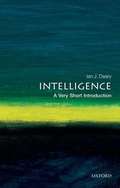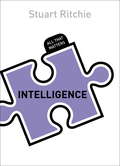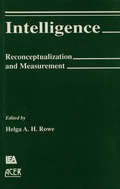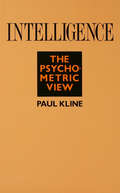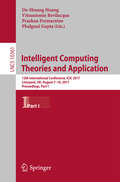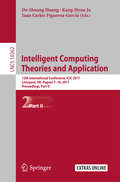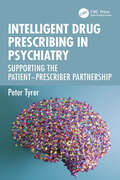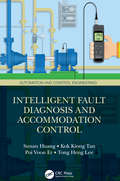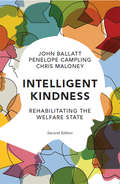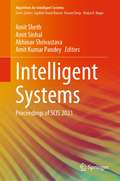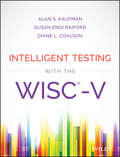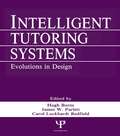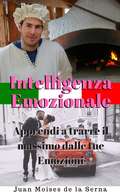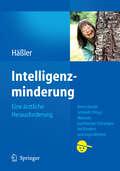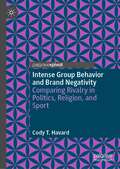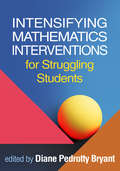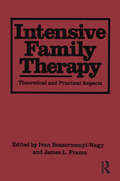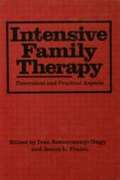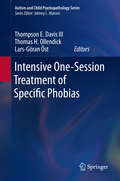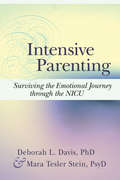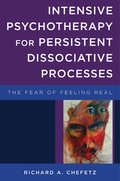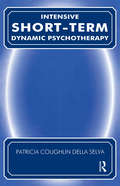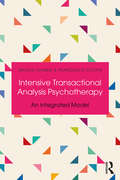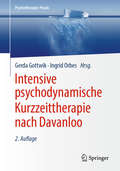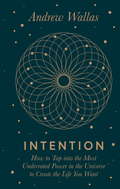- Table View
- List View
Intelligence: A Very Short Introduction
by Ian J. DearyFor people with little or no knowledge of the science of human intelligence, this volume takes readers to a stage where they are able to make judgments for themselves about the key questions of human mental ability. Each chapter addresses a central scientific issue but does so in a way that is lively and completely accessible. Issues discussed include whether there are several different types of intelligence, whether intelligence differences are caused by genes or the environment, the biological basis of intelligence levels, and whether intelligence declines as we grow older.
Intelligence: All That Matters (All That Matters)
by Stuart RitchieThere is a strange disconnect between the scientific consensus and the public mind on intelligence testing. Just mention IQ testing in polite company, and you'll sternly be informed that IQ tests don't measure anything "real", and only reflect how good you are at doing IQ tests; that they ignore important traits like "emotional intelligence" and "multiple intelligences"; and that those who are interested in IQ testing must be elitists, or maybe something more sinister.Yet the scientific evidence is clear: IQ tests are extraordinarily useful. IQ scores are related to a huge variety of important life outcomes like educational success, income, and even life expectancy, and biological studies have shown they are genetically influenced and linked to measures of the brain. Studies of intelligence and IQ are regularly published in the world's top scientific journals.This book will offer an entertaining introduction to the state of the art in intelligence and IQ, and will show how we have arrived at what we know from a century's research. It will engage head-on with many of the criticisms of IQ testing by describing the latest high-quality scientific research, but will not be a simple point-by-point rebuttal: it will make a positive case for IQ research, focusing on the potential benefits for society that a better understanding of intelligence can bring.
Intelligence: Reconceptualization and Measurement
by Helga A. H. RoweAs reform in all sectors of education continues, it is becoming increasingly important that we develop a rich understanding of what "intelligence" is, and how it can be improved. Reflecting current views on the manifestation, development, and assessment of human intelligence, this volume addresses a rich diversity of theoretical, methodological, and applied issues -- a number of which have not been raised previously. The contributors to this collection -- highly regarded experts from various countries -- propose perspectives for future research, their intent being not so much to predict the future, but to help shape it.
Intelligence: The Psychometric View
by Paul KlinePaul Kline's latest book provides a readable modern account of the psychometric view of intelligence. It explains factor analysis and the construction of intelligence tests, and shows how the resulting factors provide a picture of human abilities. Written to be clear and concise it none the less provides a rigorous account of the psychometric view of intelligence.
Intelligent Computing Theories and Application
by Phalguni Gupta Prashan Premaratne De-Shuang Huang Vitoantonio BevilacquaThe International Conference on Intelligent Computing (ICIC) was formed to provide an annual forum dedicated to the emerging and challenging topics in artificial intel- gence, machine learning, pattern recognition, image processing, bioinformatics, and computational biology. It aims to bring together researchers and practitioners from both academia and industry to share ideas, problems, and solutions related to the m- tifaceted aspects of intelligent computing. ICIC 2010, held in Changsha, China, August 18-21, 2010, constituted the 6th - ternational Conference on Intelligent Computing. It built upon the success of ICIC 2009, ICIC 2008, ICIC 2007, ICIC 2006, and ICIC 2005, that were held in Ulsan, Korea, Shanghai, Qingdao, Kunming and Hefei, China, respectively. This year, the conference concentrated mainly on the theories and methodologies as well as the emerging applications of intelligent computing. Its aim was to unify the picture of contemporary intelligent computing techniques as an integral concept that highlights the trends in advanced computational intelligence and bridges theoretical research with applications. Therefore, the theme for this conference was "Advanced Intelligent Computing Technology and Applications. " Papers focusing on this theme were solicited, addressing theories, methodologies, and applications in science and technology.
Intelligent Computing Theories and Application
by De-Shuang Huang Kang-Hyun Jo Juan Carlos Figueroa-GarcíaThe International Conference on Intelligent Computing (ICIC) was formed to provide an annual forum dedicated to the emerging and challenging topics in artificial intel- gence, machine learning, pattern recognition, image processing, bioinformatics, and computational biology. It aims to bring together researchers and practitioners from both academia and industry to share ideas, problems, and solutions related to the m- tifaceted aspects of intelligent computing. ICIC 2010, held in Changsha, China, August 18-21, 2010, constituted the 6th - ternational Conference on Intelligent Computing. It built upon the success of ICIC 2009, ICIC 2008, ICIC 2007, ICIC 2006, and ICIC 2005, that were held in Ulsan, Korea, Shanghai, Qingdao, Kunming and Hefei, China, respectively. This year, the conference concentrated mainly on the theories and methodologies as well as the emerging applications of intelligent computing. Its aim was to unify the picture of contemporary intelligent computing techniques as an integral concept that highlights the trends in advanced computational intelligence and bridges theoretical research with applications. Therefore, the theme for this conference was "Advanced Intelligent Computing Technology and Applications. " Papers focusing on this theme were solicited, addressing theories, methodologies, and applications in science and technology.
Intelligent Drug Prescribing in Psychiatry: Supporting the Patient-Prescriber Partnership
by Peter TyrerThis new book, drawing on the author’s distinguished career in front-line psychiatric practice, describes how to bring patient and prescriber together in an active partnership whereby there is better understanding of the positive and negative elements of drug prescription. At present there is a gap between expectations, with doctors not always able to admit their ignorance of some aspects of drug action, and patients kept unaware of these uncertainties. Balanced decision-making with joint involvement is needed to separate those drugs that are needed regularly to maintain health, those that are only needed when required and those that are mere fashion accessories. Greater care is needed over the explanation of the first prescription, the expected duration of treatment and the plans for eventual withdrawal. The consequence of a better partnership will be less over-prescribing, a reduction of polypharmacy and a lessened need for deprescribing, the planned systematic reduction of drug treatment that has got completely out of control.Concentrating on routine prescribing for psychiatric and mental health disorders rather than unusual conditions and illustrated with real-life anecdotes and case histories, this is essential reading for trainee and practising psychiatrics, general practitioners and pharmacists.
Intelligent Fault Diagnosis and Accommodation Control (Automation and Control Engineering)
by Tong Heng Lee Kok Kiong Tan Sunan Huang Poi Voon ErControl systems include many components, such as transducers, sensors, actuators and mechanical parts. These components are required to be operated under some specific conditions. However, due to prolonged operations or harsh operating environment, the properties of these devices may degrade to an unacceptable level, causing more regular fault occurrences. It is therefore necessary to diagnose faults and provide the fault-accommodation control which compensates for the fault of the component by substituting a configuration of redundant elements so that the system continues to operate satisfactorily. In this book, we present a result of several years of work in the area of fault diagnosis and fault-accommodation control. It aims at information estimate methods when faults occur. The book uses the model built from the plant or process, to detect and isolate failures, in contrast to traditional hardware or statistical technologies dealing with failures. It presents model-based learning and design technologies for fault detection, isolation and identification as well as fault-tolerant control. These models are also used to analyse the fault detectability and isolability conditions and discuss the stability of the closed-loop system. It is intended to report new technologies in the area of fault diagnosis, covering fault analysis and control strategies of design for various applications. The book addresses four main schemes: modelling of actuator or sensor faults; fault detection and isolation; fault identification, and fault reconfiguration (accommodation) control. It also covers application issues in the monitoring control of actuators, providing several interesting case studies for more application-oriented readers.
Intelligent Kindness: Rehabilitating the Welfare State
by Penelope Campling John Ballatt Chris MaloneyIntelligent Kindness examines and rehabilitates the concept of the 'welfare state'. Despite, or perhaps because of, relentless prescriptive regulatory and structural reforms, scandals continue. Staff are increasingly alienated. Drawing upon narratives and case studies, this book examines what is at stake from perspectives including ethology, psychoanalysis, group relations, and social psychology. The front line of health and social care can be bleak, despite the many rewards of the work, often leaving staff demoralised and exhausted. Their continued well-being, while delivering compassionate and effective care, depends on the cultivation of a culture of kinship, mutuality and collaborative relationships. The authors provide practical, achievable advice that will support and sustain healthy organisational culture and effective, humane practice. Grounded in lived experiences and observations, Intelligent Kindness is a powerful argument for the welfare state and a valuable approach to service reform.
Intelligent Systems: Proceedings of SCIS 2021 (Algorithms for Intelligent Systems)
by Amit Sheth Amit Sinhal Abhinav Shrivastava Amit Kumar PandeyThis book contains the latest computational intelligence methodologies and applications. This book is a collection of selected papers presented at International Conference on Sustainable Computing and Intelligent Systems (SCIS 2021), held in Jaipur, India, during February 5–6, 2021. It includes novel and innovative work from experts, practitioners, scientists, and decision-makers from academia and industry. It covers selected papers in the area of artificial intelligence and intelligent systems, intelligent business systems, machine intelligence, computer vision, Web intelligence, big data analytics, swarm intelligence, and related topics.
Intelligent Testing with the WISC-V
by Alan S. Kaufman Diane L. Coalson Susan Engi RaifordInterpret the WISC–V to help diagnose learning disabilities and to translate profiles of test scores to educational action The Wechsler Intelligence Scale for Children—Fifth Edition (WISC–V) is a valuable tool for assessing children and adolescents with learning disorders—and Intelligent Testing with the WISC–V offers the comprehensive guidance you need to administer, score, and interpret WISC–V profiles for informing diagnoses and making meaningful educational recommendations. This essential resource provides you with cutting-edge expertise on how to interpret the WISC–V, which has an expanded test structure, additional subtests, and an array of new composites. Intelligent Testing offers valuable advice from experienced professionals with regard to clinically applying the WISC–V in an effort to understand a child's strengths and weaknesses—and to create a targeted, appropriate intervention plan. Ultimately, this book equips you with the information you need to identify the best theory-based methods for interpreting each child's profile of test scores within the context of his or her background and behaviors. Intelligent Testing provides a strong theoretical basis for interpreting the WISC–V from several vantage points, such as neuropsychological processing theory and the Cattell-Horn-Carroll (CHC) model, yet it permits you to interpret children's profiles using simple, straightforward steps. The most frequently used IQ test in the world, the WISC–V (like previous versions of the WISC) plays an integral role in evaluating children for learning and intellectual disabilities, developmental and language delays, and gifted and talented classifications. As such, understanding how to use the latest version of WISC is extremely important when assessing children and adolescents ages 6 to 16 years. Explore all aspects of both the conventional WISC–V and WISC–V Digital Read objective, independent test reviews of the WISC–V from independent, highly-respected expert sources Review 17 clinical case reports that spotlight experiences of children and adolescents referred to psychologists for diverse reasons such as reading problems, specific learning disabilities, ADHD, intellectual giftedness, and autistic spectrum disorders Learn how a broad-based, multi-faceted approach to interpretation that calls upon several scientific concepts from the fields of cognitive neuroscience, clinical and school neuropsychology, neuropsychological processing, and the CHC model, can benefit children by providing meaningful recommendations to parents, teachers, and often to the children and adolescents themselves Use the results of WISC–V as a helping agent to assist in creating the best intervention plan, rather than allowing test results to dictate placement or labeling Intelligent Testing with the WISC–V is an indispensable resource for professionals who work with the WISC–V, including school psychologists, clinical psychologists, educational diagnosticians, and more.
Intelligent Tutoring Systems: Evolutions in Design
by Hugh Burns James W. Parlett Carol Luckhardt RedfieldThis is a collection of essays on issues related to the evolutionary design and the practical future of intelligent tutoring systems. Following in the tradition of Foundations of Intelligent Tutoring Systems and Intelligent Tutoring Systems: Lessons Learned, this volume examines some of the visions and near-term issues that have been further explored and better defined since those groundbreaking books first appeared. Questions addressed in this volume include: *How can knowledge bases generate explanations? *Will case-based reasoning techniques be worth pursuing in the ITS framework? *Will high performance skills be successfully taught in an ITS design? *Are there dimensions of ITS design which the research laboratories are ignoring, and ignoring at the customer's peril? Of particular importance to those engaged in research and development, this book will be of value to all who wish to apprise themselves of the advances being made in the rapidly evolving field of intelligent tutoring systems.
Intelligenza Emozionale: Apprendi a trarre il massimo dalle tue Emozioni
by Juan Moises de la Serna Benvegnu' LoredanaIn questo e-book si sono esposte in maniera semplice e chiara le principali teorie a sostegno dell’Intelligenza Emozionale , la sua definizione ed i benefici sociali apportati al praticarla,segnalando le possibili problematiche causate dal mancato sviluppo di quest’ultima grazie all’esposizione delle recenti investigazioni in merito, per poter permettere al lettore una visione globale ed aggiornata dell’argomento.
Intelligenzminderung
by Frank HäßlerDie Kenntnis der verschiedenen Ausprägungsarten von geistiger Behinderung und Minderbegabung ist entscheidend für Diagnose und Therapie. Früh beginnende Fördermaßnahmen sind notwendig, damit Kinder die Fähigkeiten und Fertigkeiten erlernen, die ihnen eine Teilhabe am sozialen Leben ermöglichen. Bei der Reihe "Manuale psychischer Störungen bei Kindern und Jugendlichen" steht der Patient im Mittelpunkt. Die Bücher bieten Betroffenen Tipps und Tricks zur Bewältigung des Alltags, Therapeuten erhalten wissenschaftlich fundierte Informationen.
Intense Group Behavior and Brand Negativity: Comparing Rivalry in Politics, Religion, and Sport
by Cody T. HavardIn previous books, the author has investigated rivalry in the context of sport and non-sport settings. This book investigates how rivalry and group member behavior manifests in the setting of politics, religion, and sport, three settings of intense group member bias. Building on the author’s Hierarchy of Out-group Derogation (HOD) and Out-group Derogation Spectrum (ODS), it discusses the potential of common interests to drive out-group cooperation. The work ends with a call for future research to better understand how to decrease out-group derogation and negativity. Incorporating research from marketing, psychology, political science, and sociology, this book offers researchers in several fields a new understanding of how setting and group membership influences the ways people view and behave toward out-groups.
Intensifying Mathematics Interventions for Struggling Students (The Guilford Series on Intensive Instruction)
by Diane Pedrotty BryantThis key resource for K–12 educators offers a systematic guide to delivering Tier 2 and 3 math interventions within a multi-tiered system of support. The volume explains critical math areas in which many students have difficulty--early numeracy, time and money measurement, number combinations, fractions, word-problem solving, algebra, and more. Leading experts describe relevant standards and show how to use data-based individualization to plan, monitor, and intensify instruction in each area. Beginning with bulleted guiding questions, chapters feature a wealth of evidence-based intervention strategies, lesson-planning ideas, and case examples. Reproducible instructional activities and planning forms can be downloaded and printed in a convenient 8 1/2" x 11" size.
Intensive Family Therapy: Theoretical And Practical Aspects
by Ivan Boszormenyi-Nagy James L. FramoThe chapters of this volume were written for the purpose of surveying the field of intensive family therapy. The book is not a compilation of previously published articles; all of the chapters are original contributions written at the request of the editors. The structure of the volume was determined by the editors' experience with family therapy and their continuous exchange with other workers in the field through symposia, personal discussions, and, in most cases, direct observation of their work.
Intensive Family Therapy: Theoretical and Practical Aspects
by Ivan Boszormenyi-Nagy James L. FramoA review of concepts in the study and treatment of families of schizophrenics / Gerald H. Zuk, David Rubenstein -- A theory of relationships: experience and transaction / Ivan Boszormenyi-Nagy -- Intensive family therapy as process / Ivan Boszormenyi-Nagy -- Rationale and techniques of intensive family therapy / James L. Framo -- Family psychotherapy with schizophrenia in the hospital and in private practice / Murray Bowen -- Family dynamics and the reversibility of delusional formation: a case study in family therapy / Nathan W. Ackerman, Paul F. Franklin -- Some indications and contraindications for exploratory family therapy / Lyman C. Wynne -- Countertransference in the family treatment of schizophrenia / Carl A. Whitaker, Richard E. Felder, John Warkentin -- Mystification, confusion, and conflict / Ronald D. Laing -- The identity struggle / Anthony F.C. Wallace, Raymond C. Fogelson -- Systematic research on family dynamics / James L. Framo -- The contributions of family treatment to the psychotherapy of schizophrenia / Harold F. Searles.
Intensive One-Session Treatment of Specific Phobias
by Thomas H. Ollendick Lars-Göran Öst Thompson E. Davis IIIWhether it's dogs, spiders, blood, heights or some other fear, specific phobias are one of the most prevalent mental health problems, affecting as many as one in eight people. In recent years, cognitive-behavioral therapy (CBT) has emerged as particularly effective in treating young people and adults with specific phobias. And of these methods, one-session treatment stands out as a long-lasting, cost-effective intervention of choice. Intensive One-Session Treatment of Specific Phobias not only provides a summary of the evidence base, it also serves as a practical reference and training guide. This concise volume examines the phenomenology, epidemiology, and etiology of phobias, laying the groundwork for subsequent discussion of assessment strategies, empirically sound one-session treatment methods, and special topics. In addition, expert contributors address challenges common to exposure therapy, offer age-appropriate guidelines for treating young clients, and describe innovative computer-assisted techniques. Organized to be read individually or in sequence, chapters delve into key areas, including: Evidence-based assessment and treatment of specific phobias in children, adolescents, and adults.One-session treatment theory and practice with children, adolescents, and adults.Handling difficult cases of specific phobias in youth.Interventions for specific phobias in special populations.Training and assessing therapists in one-session treatment.Ethical issues in considering exposure. Intensive One-Session Treatment of Specific Phobias is an essential resource for researchers, clinicians, and graduate students in child, school, clinical, and counseling psychology; social work; and general and special education.
Intensive Parenting
by Ph.D. Deborah L. Davis Mara Tesler SteinParenthood transforms you. Even before this crisis, you may have experienced a wide range of feelings triggered by pregnancy, birth, and welcoming a new baby. The NICU experience challenges your emotional coping, your developing parental identity, your relationship skills, and your ability to adjust. Intensive Parenting explores the emotions of parenting in the neonatal intensive care unit, from in-hospital through issues and concerns after the child is home. Deboral L. Davis and Mara Tesler Stein describe and affirm the wide range of experiences and emotional reactions that occur in the NICU and offer strategies for parents coping with their baby's condition and hospitalization. Deborah L. Davis, PhD, is a developmental psychologist and writer who is the author of several books that support grieving parents including Empty Cradle, Broken Heart: Surviving the Death of Your Baby and Loving and Letting Go. Mara Tesler Stein, PsyD, is a clinical psychologist. She consults to healthcare providers and hospitals, guiding their efforts to improve the level of psychological support and care to families in Labor and Delivery and in the NICU. She specializes in the emotional aspects of coping with crisis around pregnancy and parenting.
Intensive Psychotherapy for Persistent Dissociative Processes: The Fear of Feeling Real (Norton Series on Interpersonal Neurobiology)
by Richard A. ChefetzWinner of the International Society for the Study of Trauma and Dissociation's (ISSTD) Pierre Janet Writing Award, 2015. What really happens in dissociation. Dissociative processes have long burdened trauma survivors with the dilemma of longing to feel "real" at the same time as they desperately want to avoid the pain that comes with that healing--a dilemma that often presents particularly acute difficulties for healing professionals. Recent clinical and neurobiological research sheds some light into the dark corners of a mind undergoing persistent dissociation, but its integration into the practice of talking therapy has never, until now, been fully realized. Intensive Psychotherapy for Persistent Dissociative Processes brings readers into the consultation room, and into the minds of both patient and therapist, like no other work on the treatment of trauma and dissociation. Richard A. Chefetz marries neuroscientific sophistication with a wealth of extended case histories, following patients over several years and offering several verbatim session transcripts. His unpacking of the emotionally impactful experience of psychodynamic talking therapy is masterfully written, clearly accessible, and singularly thorough. From neurobiological foundations he builds a working understanding of dissociation and its clinical manifestations. Drawing on theories of self-states and their involvement in dissociative experiences, he demonstrates how to identify persistent dissociation and its related psychodynamic processes, including repetition compulsion and enactment. He then guides readers through the beginning stages of a treatment, with particular attention to the psychodynamics of emotion in both patient and therapist. The second half of the book immerses readers in emotionally challenging clinical processes, offering insight into the neurobiology of fear and depersonalization, as well as case examples detailing struggles with histories of incest, sexual addiction, severe negativity, negative therapeutic reactions, enactment, and object-coercive doubting. The narrative style of Chefetz's casework is nearly novelistic, bringing to life the clinical setting and the struggles in both patient and therapist. The only mystery in this clinical exposition, as it explores several cases over a number of years, is what will happen next. In the depth of his examples and in continual, self-reflexive analysis of flaws in past treatments, Chefetz is both a generous guide and an expert storyteller. Intensive Psychotherapy for Persistent Dissociative Processes is unique in its ability to place readers in the consultation room of psychodynamic therapy. With an evidence-focused approach based in neurobiology and a bold clinical scope, it will be indispensible to new and experienced therapists alike as they grapple with the most intractable clinical obstacles.
Intensive Short-Term Dynamic Psychotherapy: Theory and Technique
by Patricia C. Della SelvaTraditionally, psychoanalytic treatment has been a lengthy endeavour, requiring a long-term commitment from patient and analyst, as well as vast financial resources. More recently, short-term approaches to psychoanalytic treatment have proliferated. One of the most well-known and thoroughly studied is the groundbreaking method of Intensive Short-term Dynamic Psychotherapy, developed by Dr. Habib Davanloo. Having trained directly with Dr. Davenloo, the author has written a clear, concise outline of the method that has come to be regarded as a classic in the field. The book is organised in a systematic fashion, analogous to the process of therapy itself, from initial contact through to termination and follow-up. Detailed clinical examples are presented throughout the text to illustrate how theory is translated into techniques of unparalleled power and effectiveness.
Intensive Transactional Analysis Psychotherapy: An Integrated Model
by Marco Sambin Francesco ScottaIntensive Transactional Analysis Psychotherapy: An Integrated Model (ITAP) introduces a new approach of psychotherapy. Based on psychodynamic foundations, the ITAP integrates the most recent trends in short-term dynamic psychotherapy and Transactional Analysis. This book develops an innovative, clear and complete clinical model of ITAP, and introduces the reader, step-by-step, to the theoretical basis underlying the technique of this intervention. The authors introduce the therapeutic procedure by bringing together the theory with brief clinical examples, thereby demonstrating the attitude of the intense therapist as well as which theoretical pathways to take to progress with the patient. In addition to the modulation of the technique based on the level of the patient’s suffering, there is also a systematic examination of which cases should be treated with ITAP, and in what way. Intensive Transactional Analysis Psychotherapy is a therapy which can be easily used by all therapists, and this book will be of great interest to Transactional Analysis therapists and other therapists interested in Transactional Analysis and short-term dynamic psychotherapy.
Intensive psychodynamische Kurzzeittherapie nach Davanloo (Psychotherapie: Praxis)
by Gerda Gottwik Ingrid OrbesDie Intensive Psychodynamische Kurzzeittherapie nach Prof. Habib Davanloo (IS-TDP) basiert auf 40 Jahren empirischer Forschung und ist eine umfassende, revolutionäre Therapiemethode für alle neurotischen Störungen und Persönlichkeitsstörungen. In diesem bisher einzigen deutschsprachigen Werk zu IS-TDP wird das Konzept ausführlich erläutert. Neben einer Einführung in die Theorie bietet es viele Beispiele, die die besondere technische Intervention der IS-TDP aufzeigen. Behandelt wird ferner die Anwendung der Therapie bei verschiedenen Störungsbildern.
Intention: How to tap into the most underrated power in the universe
by Andrew Wallas Business Alchemy LimitedIntention is the seed of all change and it is the creative power that fulfils our dreams. An intention contains the DNA of manifestation and it is therefore the key to creating the life you want. Our outer world is a reflection of our inner world, and so the only way to shift reality is to start with what is inside us.According to research, 92% of new year resolutions fail by the end of the year. The only way to reverse this trend is to go deeper.This powerful book guides you through a process of practical self-enquiry that gets to the true heart of your intentions for this life. You will weed out the obstacles in the way of your wishes, such as limiting self-beliefs and the stories you currently tell about yourself. You will plant the seeds of intention with a sense of true clarity and infinite possibility, and then water them with your daily actions and care. And then all that needs to be done is to trust in the outcome and allow your intentions to grow.Intention is for anyone who wishes to align their life with their innermost wishes and tap into the most underrated power in the universe.PRAISE FOR Intention:"It is a joy to find a life-changing book that is so clearly and beautifully written. Andrew Wallas distils decades of clinical practice with wisdom and a deceptively light touch. The overall message is strong. We are each responsible for our own path to happiness, and Intention is the inspiring guidebook that can help us to find it." - Georgia Coleridge, author of The Chakra Project PRAISE FOR ANDREW WALLAS:"Intention is a superpower which when used correctly aligns us to our purpose and helps fulfil our heart's work. Andrew Wallas elegantly and generously shows us how. His approach is simple, yet it is not easy - but boy is it worth it." Emma Cannon, fertility and women's health expert, acupuncturist and author of Fertile "Andrew holds the space for you to reconnect with your inner wisdom. His skill is that he is intuitive but practical." - Financial Times, How To Spend It"Fast-tracked healing" - Vogue "Andrew Wallas has a gift for transforming stuck energy and releasing you from negative patterns" - Tatler"With easy charm and 30 years' experience as a psychotherapist, Andrew Wallas helps clients remove the obstacles standing in their way"- Vanity Fair "He has an uncanny ability to sense emotional blocks and asks penetrating questions that unearth destructive patterns of behaviour" - The Daily Mail"Amazingly honest. Incredibly insightful. For any blocks you need to uncover to be able to create the life you want - visit the Wizard" - Tanya, business woman"I have met many "spiritual" healers, guides and psychics over the years. However, none of them have managed to explain to me in terms that I understand how I can effectively blend the real or human world with this spiritual calling that I feel. I believe that I have found in you my guru / teacher that can really help me navigate this exciting journey" - Gavin, businessman
